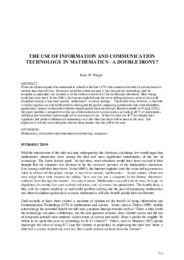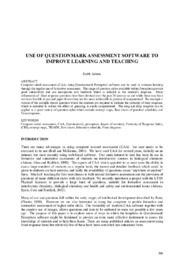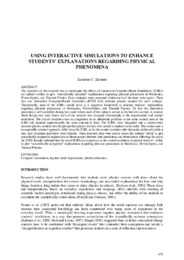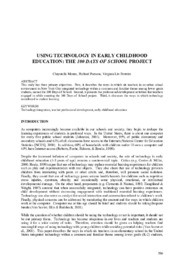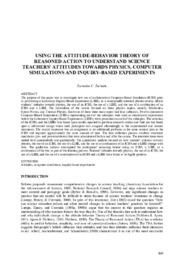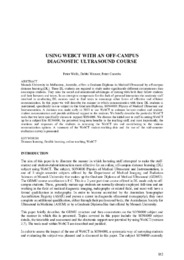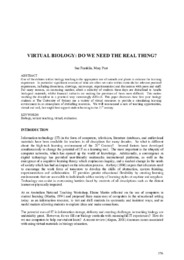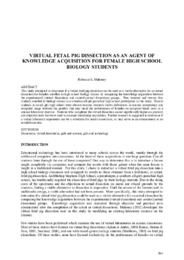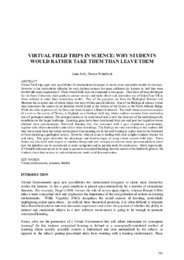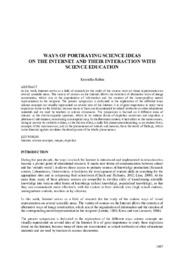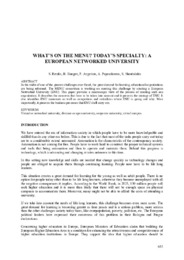Browsing CBLIS Conference Proceedings 2003 Volume I: New Technologies and their applications in education by Title
Now showing items 103-120 of 120
-
Telecommunications technologies and Curriculum development: the case of a virtual High school project
(Department of Educational Sciences, University of Cyprus, 2003)In this paper we present the lessons we learned from developing online classes for a virtual high school (LUDAVHS) project and discuss the implications for teaching science using telecommunication technologies. Emphasis ... -
A tool to support interaction and collaboration analysis of learning activities
(Department of Educational Sciences, University of Cyprus, 2003)An increasing amount of data is collected today during studies in which students and educators are engaged in learning activities using information technology and other tools. These data are indispensable for analysis ... -
The use of information and communication technology in mathematics - a double irony?
(Department of Educational Sciences, University of Cyprus, 2003)When the microcomputer was introduced to schools in the late 1970’s the connection between it and mathematics seemed more than obvious. Educators would have been excused if they thought that technology (and the computer ... -
Use of questionmark assessment software to improve learning and teaching
(Department of Educational Sciences, University of Cyprus, 2003)Computer aided assessment (CAA) using Questionmark Perception software can be used to enhance learning through the regular use of formative assessment. The range of question styles available within Perception provide good ... -
Using interactive simulations to enhance Students’ explanations regarding physical Phenomena
(Department of Educational Sciences, University of Cyprus, 2003)The objective of this research was to investigate the effects of Interactive Computer-Based Simulations (ICBSs) on student’s ability to give “scientifically accepted” explanations regarding physical phenomena in Mechanics, ... -
Using technology in early childhood education: the 100 days of school project
(Department of Educational Sciences, University of Cyprus, 2003)This study has three primary objectives. First, it describes the ways in which six teachers in an urban school environment in New York City integrated technology within a common and familiar theme among lower grade students, ... -
Using the attitude-behavior theory of Reasoned action to understand science teachers' attitudes towards physics, computer simulations and inquiry-based experiments
(Department of Educational Sciences, University of Cyprus, 2003)The purpose of this paper was to investigate how use of an Interactive Computer-Based Simulation (ICBS) prior to performing a Laboratory Inquiry-Based Experiment (LIBE), in a conceptually oriented physics course, affects ... -
Using webct with an off-campus diagnostic ultrasound course
(Department of Educational Sciences, University of Cyprus, 2003)Monash University in Melbourne, Australia, offers a Graduate Diploma in Medical Ultrasound by off-campus distance learning (DL). These DL students are required to study under significantly different circumstances than ... -
Virtual biology: do we need the real thing?
(Department of Educational Sciences, University of Cyprus, 2003)One of the debates within biology teaching is the appropriate use of animals and plants to enhance the learning experience. In particular significant amounts of time are often set aside within curricula for relevant practical ... -
Virtual fetal pig dissection as an agent of Knowledge acquisition for female high school Biology students
(Department of Educational Sciences, University of Cyprus, 2003)This study attempted to determine if a virtual fetal pig dissection can be used as a viable alternative for an actual dissection for females enrolled in high school biology classes by comparing the knowledge acquisition ... -
Virtual field trips in science: why students Would rather take them than leave them
(Department of Educational Sciences, University of Cyprus, 2003)Virtual Field trips open new possibilities for instructional designers to create more interactive worlds for learners. However is the interactivity afforded by such desktop systems for users sufficient for learners to feel ... -
Virtual optical illusions for creative learning
(Department of Educational Sciences, University of Cyprus, 2003)An amazing “rotating ring” optical illusion was studied in the frames of the students’ educational computer-based research work. Virtual images of differently shaped moving objects were simulated in QBasic 71, MS Visual ... -
Ways of portraying science ideas on the internet and their interaction with science education
(Department of Educational Sciences, University of Cyprus, 2003)In this work, Internet serves as a field of research for the study of the various ways of visual representation on several scientific areas. The variety of sources on the Internet allows the detection of alternative ways ... -
Web-based environment for design, development and learn with performance-centered Educational systems
(Department of Educational Sciences, University of Cyprus, 2003)Web-based performance-centred educational system is an integrated environment, which is available via Internet and is structured to provide individualized online access to the full range of information, guidance, advice, ... -
Webcoct – a tool for producing web-based courses
(Department of Educational Sciences, University of Cyprus, 2003)The aim of the paper is to describe the project WeBCoCT (Web Based Courses Creating Tools) intended to become a learning environment to help academic teachers to introduce web-based courses. WeBCoCT has as its main goal ... -
Webtop: web-based interactive 3d optics and Waves simulations
(Department of Educational Sciences, University of Cyprus, 2003)WebTOP is a three-dimensional, interactive computer graphics system developed at Mississippi State University to help students learn about optics and waves. It has been used to help teach undergraduate introductory physics ... -
What’s on the menu? Today’s specialty: a European networked university
(Department of Educational Sciences, University of Cyprus, 2003)In the midst of one of the greatest challenges ever faced, the great demand for learning, educational organizations are being reformed. The MENU consortium is working on meeting this challenge by creating a European Networked ... -
When computer use is associated with Negative science achievement
(Department of Educational Sciences, University of Cyprus, 2003)One surprising result of the Third International Mathematics and Science Study (TIMSS) is that computer use in the classroom was negatively associated with high student achievement in Cyprus, Hong Kong and the USA. The ...


